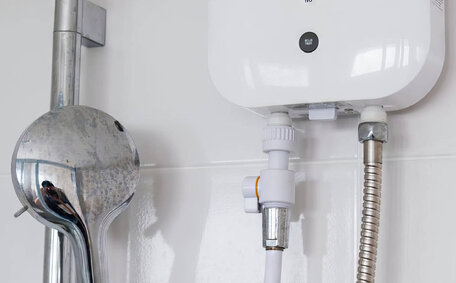How Energy-Efficient Hot Water Systems Work
Energy-efficient hot water systems utilise technology that requires less energy to heat water compared to conventional storage tanks. Rather than constantly heating a tank of water, they heat water on demand, only when it’s needed. This results in less standby energy loss.
Solar systems use thermal panels to capture heat from sunlight. Both methods require less electricity or gas to operate.
Heat pumps use electricity to extract heat from the air and transfer it to the water. Heat pump and solar hot water systems are two common types of energy-efficient systems.
By reducing energy consumption, these systems can lead to lower energy bills for homeowners in areas like Erkine Park. They help decrease greenhouse gas emissions as well. While the upfront cost of energy-efficient systems is often higher, the long-term savings on utilities can make them a smart investment for many homes.
Types of Energy-Efficient Hot Water Systems
There are several types of energy-efficient hot water systems to consider for your home:
Heat Pump Systems
Heat pump hot water systems use electricity to extract heat from the air and transfer it to heat water. This makes them 2-3 times more energy efficient than conventional electric hot water systems. While the upfront cost is higher, the energy savings often make up for it over time.
Solar Hot Water Systems
Solar hot water systems use solar thermal panels to capture heat from sunlight. This heated water is then stored in an insulated tank. Solar systems can provide up to 60% of a household’s hot water needs and also lower energy bills.
Gas Hot Water Systems
While not as efficient as heat pumps or solar, modern gas hot water systems are still more energy-efficient than older storage tank systems. Condensing gas systems capture heat from exhaust gases to preheat incoming cold water.
Electric Storage Tank Systems
Electric storage tank water heaters are the most widely used. While affordable upfront, they can be expensive to run long-term. New tanks have more insulation to reduce standby heat losses.
Heat Pump Hot Water Systems
Heat pump hot water systems are one of the most energy-efficient types of hot water systems. They work by extracting heat from the surrounding air and using it to heat water stored in an insulated tank. This allows them to utilise 60-75% less electricity compared to conventional electric storage tank water heaters.
Some key benefits of heat pump systems include:
- Lower energy bills - Less power is needed to heat water due to their high efficiency.
- Environmentally friendly - Produce fewer greenhouse gas emissions than systems relying on fossil fuels.
- Cost effective - While more expensive upfront, the energy savings over time make them a smart investment.
- Reliable hot water - Built-in backup electric heating elements ensure hot water even on cooler days.
Potential downsides include higher upfront costs and the need for sufficient clearance around outdoor units for air flow. Overall, heat pump water heaters are one of the best options for energy-efficient hot water in areas like Erkine Park.
Solar hot water systems harness the sun’s thermal energy to heat water. They use solar collector panels, usually installed on the roof, that absorb heat from sunlight. This solar heat is then transferred to water stored in a well-insulated storage tank.
Solar systems provide around 60% of a household’s hot water needs. Even on overcast days, the systems still capture enough ambient heat to warm the water. For colder climates, most solar hot water systems have an electric or gas booster as backup on cloudy days.
A key benefit of solar hot water is the potential energy savings. Solar thermal systems can reduce conventional water heating costs by 50-90%, providing essentially free hot water from the sun’s rays. This can pare down utility bills substantially over time.
While solar hot water systems have a high upfront cost, families in Erkine Park can recoup the investment in energy savings within 5-10 years in most cases. For those looking to go green and reduce energy consumption, solar water heating is one of the most effective options.
Benefits of Installing an Energy-Efficient Hot Water System
Installing an energy-efficient hot water system provides several advantages for homeowners looking to save money and energy:
- Lower utility bills - Energy-efficient systems like heat pumps and solar require less electricity or gas to heat water.
- Reduced energy consumption - Advanced systems can lower energy usage by 50% or more compared to conventional options.
- Lower carbon footprint - Systems relying on renewable technology produce fewer greenhouse gas emissions.
- Rebates and incentives - Many energy providers offer rebates for installing eligible efficient water heating systems.
- Easy maintenance - Newer systems require less maintenance and have longer warranties.
- Peace of mind - Efficient systems provide reliable hot water while keeping costs down.
With lower operating costs, reduced environmental impact, and innovative technology, energy-efficient hot water systems are a smart, forward-looking home investment for residents in areas like Erkine Park.
Lower Energy Usage and Utility Bills
One of the biggest perks of installing an energy-efficient hot water system is the potential for lower energy usage and reduced utility bills. Systems like heat pumps and solar water heaters require significantly less electricity or gas to operate compared to conventional options.
A heat pump system can decrease electricity consumption for water heating by 60-75%. Solar thermal systems can pare down conventional water heating costs by 50-90% by harnessing free energy from the sun. With dramatically lower energy needs, utility bills are slashed as a direct result.
Many homeowners in Erkine Park could save hundreds per year on their energy bills just by upgrading to an efficient system. Many homeowners in Erkine Park could save hundreds per year on their energy bills just by upgrading to an efficient system.
While the upfront cost is higher, the long-term savings make these systems a smart investment.
Reduced Environmental Impact
p>p>p>p>p>p>
Government Rebates and Incentives
Upgrading your hot water system to an energy-efficient model may make you eligible for government rebates and incentives. Many energy providers and local councils offer financial incentives to help offset the upfront costs of installing more eco-friendly systems.
The NSW government’s Climate Change Fund provides rebates for solar hot water systems and heat pump water heaters. Eligible households can receive hundreds of dollars back when installing an approved system. Some gas providers also offer rebates for upgrading to efficient gas hot water units.
Be sure to check with your local council, energy retailer, and state government to see what rebates or incentives may be available. The potential savings can make an energy-efficient hot water system even more appealing from a financial standpoint.
With the right rebates and incentives, investing in a system like solar hot water or a heat pump heater is a smart way to save money on bills and reduce your environmental impact. Speak to one of our experts at Erkine Park Plumbing to learn more about your options.
How to Choose the Right System for Your Home
p>Choosing the most suitable hot water system for your home depends on several factors:
Fuel TypeConsider whether you want a system running on electricity, gas, or solar power. Electric and gas systems tend to have lower upfront costs, while solar has higher costs but provides greater long-term savings.
System SizeSelect a system sized appropriately for your household’s hot water usage. Consider daily routines, number of occupants, and peak demand times.
Installation RequirementsFactor in space requirements, roof strength for solar units, and any complex wiring or plumbing needs.
ClimateIn cooler climates, heat pumps and solar will need backup heating elements to ensure reliable hot water year-round.
Operating Costsp>p>p>
Calculate Your Hot Water Usage
Calculating your household’s daily hot water usage is an important step in determining what type and size of system will meet your needs.
Start by tracking your water usage for a week. Note how many loads of laundry, dishwasher cycles, showers, and baths you take each day. Also factor in water usage from tasks like washing hands and cooking.
Refer to your hot water system’s manual or contact the manufacturer to find out the litre capacity of your tank and the average litre usage for each appliance or task.
Multiply the number of each task per day by the typical usage amount. Add up the totals for each day over the week. Then divide that weekly total by 7 to get your average daily usage.
This calculated daily amount will give you an idea of the capacity and flow rate your new system will need to handle comfortably. An undersized system can lead to lukewarm showers, while an oversized one wastes energy heating excess water.
Knowing your hot water requirements makes it easier to choose the optimal system. Our experts at Erkine Park Plumbing can also assess your usage and provide professional recommendations tailored to your household.
Consider Installation and Running Costs
p>p>p>p>p>p>p>p>p>
Compare Fuel Sources
When selecting a new hot water system, one of the key considerations is which fuel source it uses. Here is an overview of the main options:
ElectricityElectric storage tank water heaters are the most widely used. While affordable upfront, running costs can be higher than gas or solar alternatives. Heat pump systems are very energy efficient but have a higher initial cost.
GasGas systems have lower operating expenses than electric tanks. They produce fewer emissions than electric, but more than heat pump or solar options. Condensing models capture heat to increase efficiency.
Solar Powerp>p>p>p>p>






